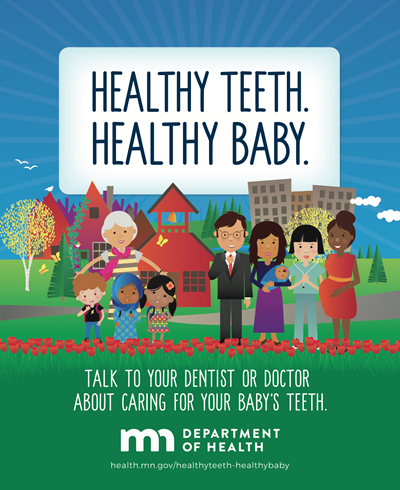Healthy Teeth. Healthy Baby.
About the initiative
Healthy Teeth. Healthy Baby. is a community-centered initiative based on the notion that prevention of early dental disease starts during pregnancy and is most effective in the first three years of life.
The initiative provides resources and education to pregnant women, expecting/new parents and caregivers of children up to the age of three. The campaign is geared toward communities of color and recent immigrants, and it is part of the larger statewide Early Dental Disease Prevention Initiative (EDDPI), which legislators called for in 2015.
Preventing early dental disease
Early childhood caries, or tooth decay, is the most common chronic disease among children in the U.S., according to the Centers for Disease Control and Prevention (CDC): Oral Health Tips for Children. Early childhood caries is an infectious disease that can begin as early as teeth appear (usually around six months) and spreads quickly. This type of decay can cause severe pain to the child and can affect talking, speech, eating, sleeping, learning and playing.
Common but costly
According to the American Academy of Pediatric Dentistry (AAPD) report The State of Little Teeth (PDF), more than one-third of children have early childhood caries by the time they enter kindergarten.
AAPD also cites Early Childhood Caries (ECC) as being:
- Five times more common than asthma
- Four times more common than early childhood obesity
- 20 times more common than diabetes
Many children with this type of decay require operations to treat the disease that may range anywhere from $2,000 to $5,000 per child per year. And even though the disease is common and expensive to treat, the good news is that it’s preventable.
How it works
Healthy Teeth. Healthy Baby. educates pregnant women, along with parents and caregivers of infants and toddlers, on early dental disease prevention to avoid tooth decay. The initiative is geared toward communities of color and recent immigrants. 
The campaign uses motivational interviewing techniques and easy-to-understand educational materials to provide information to parents and caregivers in the most appropriate manner. The goal is to lower the burden that dental disease has on health care infrastructure and decrease overall cases and impact of early tooth decay.
Healthy Teeth. Healthy Baby. focuses on five key messages:
- Understand the value of prenatal oral health.
- Check and clean your baby’s teeth to prevent cavities.
- Protect your baby’s teeth with fluoride.
- Feed your baby healthy food.
- Take your baby to a doctor or a dentist when the first tooth appears, or no later than his/her first birthday.
Educational materials
To request Healthy Teeth. Healthy Baby. print materials, please complete the Material Request Form. For digital copies, please visit the Oral Health Materials page and download materials there.
Use is encouraged in any setting where infants, young children, and families of young children are present. Materials are free of cost for the public.
Collaboration with dental and medical providers
Combining forces with the primary care and public health community is essential, especially for low-income children who most often experience barriers in accessing dental care. A well-baby visit can help fill the gap when there is not access to a dental home. The ultimate goal is connect each infant and young child to a dental home providing continuous access to appropriate preventive routine and restorative dental care.
Dental professionals and non-dental health professionals, like nurses, community health workers and physicians, all play a role in Healthy Teeth. Healthy Baby. In addition to providing ongoing care to children under the age of three, they can continue to educate children, parents and caregivers, and help prevent early dental disease.
Get involved
We need the involvement of parents, caregivers and community partners, along with both dental and medical providers, in order for Healthy Teeth. Healthy Baby. to be successful. Community organizations can contact the Oral Health Program directly to organize an educational session for communities. As part of the session MDH will use easy-to-understand educational materials, hands-on models and oral hygiene kits to educate new and expecting parents and caregivers.
To get involved or learn more about the initiative, contact health.oral@state.mn.us.